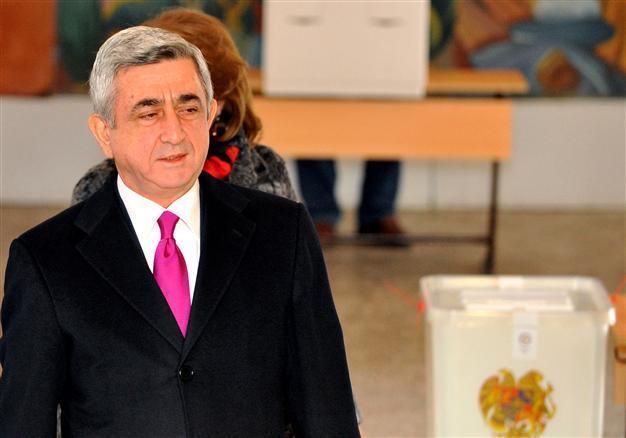Armenian president triumphs in 'uncompetitive' polls
YEREVAN – Agence France-Presse

Armenian President Serzh Sarkisian. AFP Photo
Armenian President Serzh Sarkisian Tuesday celebrated a crushing victory in elections for a second five-year mandate but his rival alleged violations and observers complained the polls lacked competition.Sarkisian, a shrewd former military officer in power since 2008, won Monday's polls in the small ex-Soviet state nestled in the Caucasus mountains between Turkey and Iran with 58.64 percent of the votes. His nearest rival, former foreign minister Raffi Hovannisian trailed in a distant second place with 36.75 percent of votes, the central election commission said after counting results from all the precincts.
"These elections have again shown that the Armenian people can unite and take the right decision at the most important moments," Sarkisian told supporters at his campaign headquarters.
"I am proud and hope that all who did not vote for me understand the choice of the majority and we develop the country under a stable situation," he said. Hovannisian's camp alleged a range of sometimes bizarre electoral violations, including the use of "disappearing ink" to allow multiple voting.
"These were shameful elections with a huge number of violations," Hovannisian's spokesman Hovsep Khurshudian told AFP.
Hovannisian himself said that Sarkisian should acknowledge the elections were a victory not for him but for the Armenian people. "The people were victorious by making clear their will in the elections," he told reporters during the count.
Observers from the OSCE Parliamentary Assembly said the elections were an improvement on past polls but lacked genuine competition.
"This election showed improvement, but lacked genuine competition," said Tonino Picula, the head of the OSCE PA mission. "Competition is critical if Armenia is going to live up to the aspirations of its people for a vibrant and engaging democracy." The observers said the voting process was well organised but confirmed the inking of passports "did not provide the intended safeguard against multiple voting as the ink could easily be wiped off." The authorities had above all been hoping for a peaceful and internationally-praised process that would improve the country's chances of European integration. The vote that brought Sarkisian to power in 2008 ended in clashes between police and supporters of the defeated opposition candidate in which 10 people died.
Former prime minister Hrant Bagratian was in third with just over two percent of the vote, with the Soviet-era dissident Paruyr Hayrikyan in fourth.
Voter turnout was 60 percent in the polls seen as a crucial democratic test for the former Soviet state.
The election was also clouded by a mysterious assassination attempt against Hayrikyan last month that at one point risked derailing the polls entirely. But the candidate in the end opted not to use his right to ask for a delay.
The outcome was already clear in December when the highly popular leader of the Prosperous Armenia party -- super-rich former arm-wrestling champion Gagik Tsarukian -- said he was out of the race and Armenia's first post-Soviet president Levon Ter-Petrosian said he was too old for the country's top job.
Sarkisian, 59, is a veteran of the 1990s war with Azerbaijan over the disputed region of Nagorny Karabakh and derives much of his popularity from a tough can-do militaristic image.
Hovannisian, 54, was born in the United States and practised law in Los Angeles before moving to Armenia following its devastating December 1988 earthquake.
All the candidates made populist promises to fight poverty and unemployment.
The World Bank estimates that 36 percent of Armenians live below the poverty line, while economic hardship and unemployment have driven nearly a million Armenians out of the country over the past two decades.
But campaigning has also focused on Armenia's long-running disputes with neighbours Turkey and Azerbaijan.
No final peace deal has been reached with Azerbaijan over the Armenian-controlled Azerbaijani region of Nagorny Karabakh as the risk of a new conflict remains palpable.
















